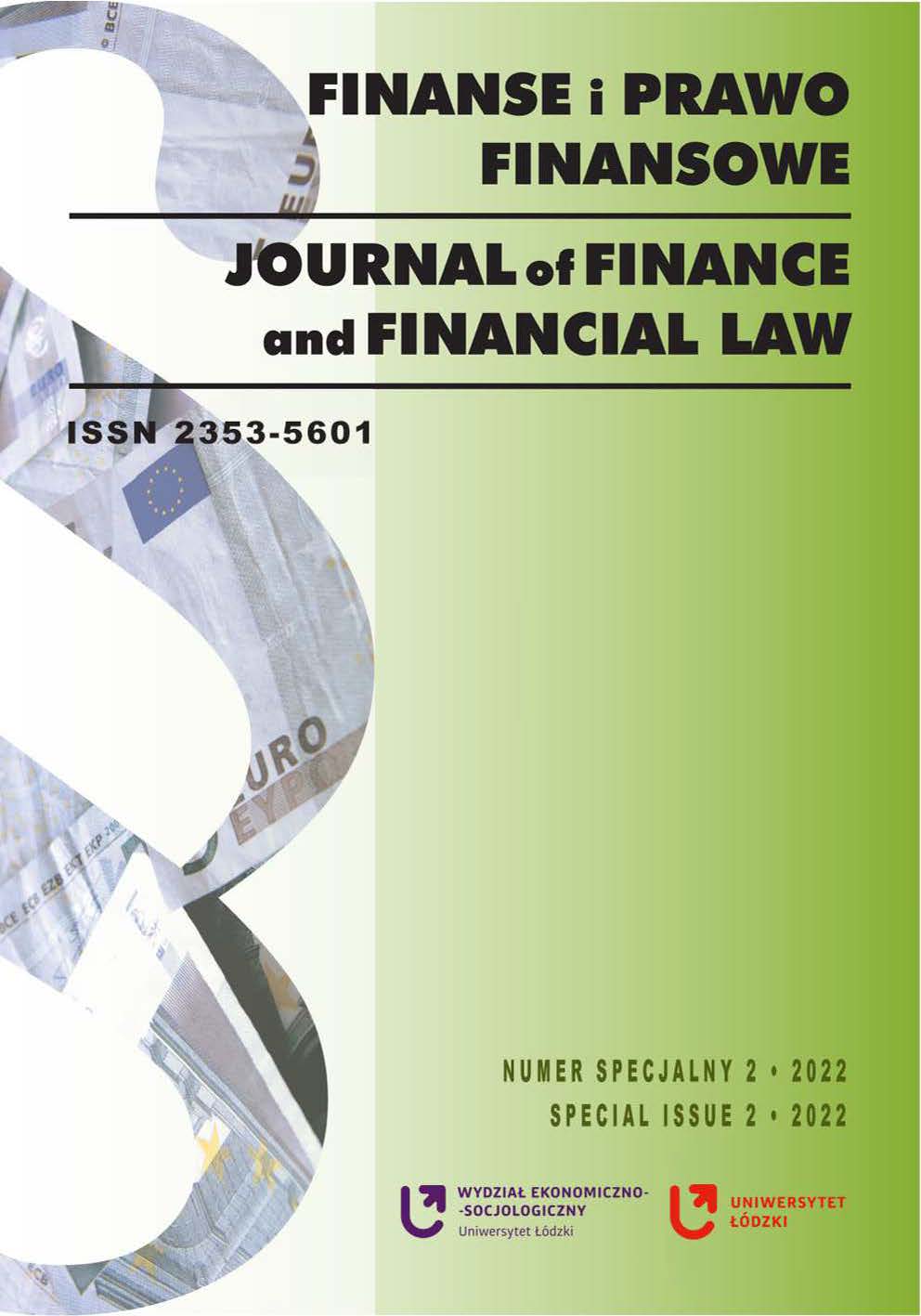The Development of Artificial Intelligence and its Impact on the Financial Market
DOI:
https://doi.org/10.18778/2391-6478.S2.2022.07Keywords:
financial market, artificial intelligence, machine learning, opportunities and threats, digitizationAbstract
The purpose of this article. The aim of the article is to analyze selected issues related to artificial intelligence and its development, particularly its impact on the financial market, taking into account the opportunities and threats that artificial intelligence and its areas, such as machine learning or deep learning, pose to financial market participants. The research methods utilized in the study were used to evaluate the phenomenon on a macroeconomic scale.
Methodology. The results of the research were based on the analysis of secondary data, such as source literature – both domestic and foreign, systems analysis of European Union legal acts, as well as the review of reports on the use of AI within the financial market. The paper is theoretical.
The result of the research. The development of artificial intelligence in financial markets may provide an opportunity to gain competitive advantage, especially for financial market participants who aptly implement AI-based solutions in its initial phase. However, this entails both benefits and risks, the possible occurrence of which depends on many other factors.
Downloads
References
Anderson, J., et al. (2021). Wpływ pandemii na wykorzystanie sztucznej inteligencji w bankowości. Obserwator finansowy. https://www.obserwatorfinansowy.pl/tematyka/rynki-finansowe/bankowosc/wplyw-pandemii-na-wykorzystanie-sztucznej-inteligencji-w-bankowosci/ [dostęp 23.12.2021].
Google Scholar
Balicki, J. (2015). Wybrane paradygmaty sztucznej inteligencji w informatycznych systemach finansowych. Współczesna Gospodarka, 4.
Google Scholar
Banaszczak-Soroka ,U. (2012). Rynki finansowe Organizacja, instytucje, uczestnicy. Warszawa: C.H. Beck.
Google Scholar
Biallas, M. i O’Neill, F. (2020). Artificial Intelligence Innovation in Financial Services. EMCom-pass, 85. International Finance Corporation, Washington, DC. https://openknowledge.worldbank.org/handle/10986/34305 License: CC BY-NC-ND 3.0 IGO.
Google Scholar
Bień, W. (2004). Rynek papierów wartościowych. Warszawa: Difin.
Google Scholar
Błachowicz, D. (2019). Automatyzacja oraz rozwój sztucznej inteligencji a sytuacja ludzi na rynku pracy w perspektywie obecnego stulecia. Rynek – Społeczeństwo – Kultura, 2(33).
Google Scholar
Brynjolfsson, E. i McAfee, A. (2011). Race Against The Machine: How the Digital Revolution is Accelerating Innovation, Driving Productivit. Warszawa: Kurhaus Publishing.
Google Scholar
Buchanan, B. (2019). Artificial intelligence in finance. http://doi.org/10.5281/zenodo.2612537
Google Scholar
Ciesielski, M. (2021). Sztuczna inteligencja w bankach powinna być szybciej wdrażana. Obserwator finansowy. https://www.obserwatorfinansowy.pl/bez-kategorii/rotator/sztuczna-inteligencja-w-bankach-powinna-byc-szybciej-wdrazana/ [dostęp 23.12.2021].
Google Scholar
Dadej, M. (2018). Rola Uczenia Maszynowego w Sektorze Finansowym (Applications of Machine Learning in Financial Sector). Wybrane Problemy Zarządzania w Gospodarce Opartej na Wiedzy – Teoria i Praktyka. https://ssrn.com/abstract=3862819 [dostęp 23.12.2021].
Google Scholar
Dennett, D.C. (2004). Can Machines Think? In: C. Teuscher, eds., Alan Turing: Life and Legacy of a Great Thinker. Berlin, Heidelberg: Springer. https://doi.org/10.1007/978-3-662-05642-4_12
Google Scholar
DOI: https://doi.org/10.1007/978-3-662-05642-4_12
Drabik, E. (2019). Analiza zależności pomiędzy grami na rynkach finansowych a rozwojem syste-mów komputerowych. W: L. Gąsiorowicz, J. Monkiewicz, red., Wyzwania współczesnych rynków finansowych. Warszawa: Wydział Zarządzania Politechniki Warszawskiej.
Google Scholar
Finextra (2021). AI in financial services: next steps to realising the potential. https://www.opentext.com/file_source/OpenText/en_US/PDF/wp-ai-financial-services-next-steps-to-realising-the-potential-en.pdf [dostęp 23.12.2021].
Google Scholar
FSB (2017). Artificial intelligence and machine learning in financial services. Market developments and financial stability implications. https://www.fsb.org/wp-content/uploads/P011117.pdf [dostęp 23.12.2021].
Google Scholar
Gadre-Patwardhan, S., Katdare, V.V. i Joshi, M.R. (2016). A Review of Artificially Intelligent Applications in the Financial Domain. In: C. Dunis, P. Middleton, A. Karathanasopolous, K. Theofilatos, eds., Artificial Intelligence in Financial Markets. New Developments in Quantita-tive Trading and Investment. London: Palgrave Macmillan. https://doi.org/10.1057/978-1-137-48880-0_1
Google Scholar
DOI: https://doi.org/10.1057/978-1-137-48880-0_1
Kabza, M. (2019). Sztuczna inteligencja zmienia system finansowy. Obserwator Finansowy. https://www.obserwatorfinansowy.pl/forma/analizy-debata/analizy/sztuczna-inteligencja-zmienia-system-finansowy/ [dostęp 27.12.2021].
Google Scholar
Komisja Europejska (2018). FinTech: Komisja podejmuje działania na rzecz bardziej konkurencyjne-go iinnowacyjnego rynku finansowego. https://eur-lex.europa.eu/resource.html?uri=cellar:6793c578-22e6-11e8-ac73-01aa75ed71a1.0007.02/DOC_1&format=PDF [dostęp 23.12.2021].
Google Scholar
Koronacki, J. (2020). Sztuczna inteligencja w odczarowanym świecie. Filozofia i nauka, 8(1).
Google Scholar
DOI: https://doi.org/10.37240/FiN.2020.8.1.1
Łańcucki, J. (2018). Klient na cyfrowym rynku ubezpieczeniowym. Prawo Asekuracyjne, 2(95).
Google Scholar
DOI: https://doi.org/10.5604/01.3001.0013.5659
Łańcucki, J. (2019). Wpływ innowacyjnych technologii na funkcjonowanie rynku ubezpieczeniowego. Prawo Asekuracyjne, 2(99).
Google Scholar
DOI: https://doi.org/10.5604/01.3001.0013.5659
McCarthy, J., Minsky, M.L., Rochester, N. i Shannon, C.E. (2006). A Proposal for the Dartmouth Summer Research Project on Artificial Intelligence, August 31, 1955. AI Magazine, 27(4), 12. https://doi.org/10.1609/aimag.v27i4.1904
Google Scholar
Milana, C. i Ashta, A. (2021). Artificial intelligence techniques in finance and financial markets: A survey of the literature. Strategic Change, 30. https://doi.org/10.1002/jsc.2403
Google Scholar
DOI: https://doi.org/10.1002/jsc.2403
Pietrzak, B., Polański, Z. i Woźniak, B. (2012). System finansowy w Polsce. Warszawa: Wydawnictwo Naukowe PWN.
Google Scholar
Stylec-Szromek, P. (2018). Sztuczna inteligencja – prawo, odpowiedzialność, etyka. Zeszyty Naukowe. Organizacja i Zarządzanie, 123.
Google Scholar
Szupiluk, R. (2016). Wzorce na rynkach finansowych. W: J. Stacewicz, red., Polityka gospodarcza w warunkach przemian rozwojowych. Warszawa: SGH.
Google Scholar
Rojszczak, M. (2020). Sztuczna inteligencja w innowacjach finansowych – aspekty prawne i regula-cyjne. Internetowy kwartalnik antymonopolowy i regulacyjny, 2(9).
Google Scholar
Wiaterek, J. (2017). Sztuczna inteligencja – analiza SWOT z perspektywy bankowości. Alterium Ośrodek Badań i Analiz Systemu Finansowego. http://alterum.pl/uploaded/Sztuczna%20inteligencja.pdf
Google Scholar
(www1) https://www.britannica.com/technology/artificial-intelligence [dostęp 23.12.2021].
Google Scholar
(www2) https://www.ey.com/pl_pl/biuletyn-ryzyka/sztuczna-inteligencja-zmienia-bran-finansow [dostęp 23.12.2021].
Google Scholar
(www3) http://it-filolog.pl/machine-learning-i-deep-learning-samouczace-systemy-leksykon-2017/ [dostęp 25.12.2021].
Google Scholar
(www4) https://www.forbes.com/sites/forbestechcouncil/2018/12/05/how-artificial-intelligence-is-helping-financial-institutions/?sh=226a116e460a [dostęp 27.12.2021].
Google Scholar
(www5) https://www.europarl.europa.eu/doceo/document/A-8-2017-0176_PL.html [dostęp 27.12.2021].
Google Scholar
Downloads
Published
How to Cite
Issue
Section
License

This work is licensed under a Creative Commons Attribution-NonCommercial-NoDerivatives 4.0 International License.
Funding data
-
Uniwersytet Ekonomiczny w Krakowie
Grant numbers 4/2021














